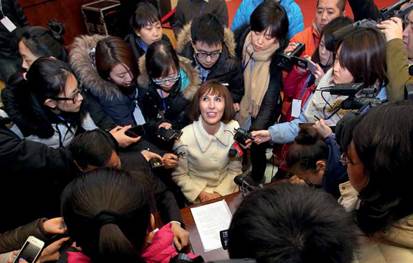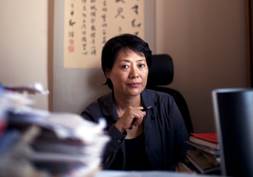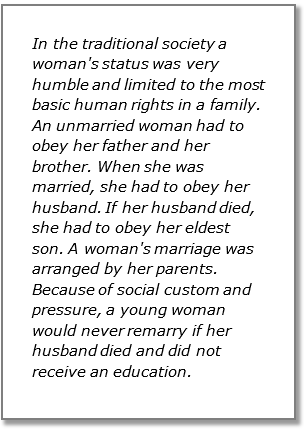News & Updates
Lotus - A trusted name in family travel
Women’s Equality: Certain Progress & Definite Limits
Chinese women have withstood incredible pressures to conform to the ideals and norms  established by the Chinese state. Whether it was Confucian values, revolutionary Maoist ideals, or the search for economic and educational advancement, women have endured numerous changes as they bent with the prevailing political winds. While political policies were often created by men, women have had limited control over how these policies played out in their daily lives.
established by the Chinese state. Whether it was Confucian values, revolutionary Maoist ideals, or the search for economic and educational advancement, women have endured numerous changes as they bent with the prevailing political winds. While political policies were often created by men, women have had limited control over how these policies played out in their daily lives.
Family Law & Women’s Recent Legislative Changes:
One area where progress has notably lagged is in the arena of family law. It was only in 2013 that the first divorce was granted on grounds of domestic violence. An American woman, Kim Lee, emerged as a  vocal voice for domestic violence survivors in China in 2011 after posting photos of her battered face to social media.
vocal voice for domestic violence survivors in China in 2011 after posting photos of her battered face to social media.
Lee was propelled into the media spotlight after she accused her husband, Li Yang, a celebrity figure, of domestic violence. She posted pictures of her injuries to social media in China after the local police told her that no crime had occurred and to go home because it was a “family matter.”
With publishing the photos, Lee also posted a graphic account of one of their altercations in English: "You knocked me to the floor. You sat on my back. You choked my neck with both hands and slammed my head into the floor. When I pried your hands from my neck you grabbed my hair and slammed my head into the floor ten more times!"
Shortly after Lee began posting online, her husband, Li Yang also went public, stating : "I hit her sometimes, but I never thought she would make it public, since it's not Chinese tradition to expose family conflicts to outsiders." .
Lee said it took her 50 to 60 hours in the police department and multiple trips to the courts to get a restraining order, even as she was receiving death threats from her estranged husband. “What I experienced — which millions of women experience — is police saying ‘It’s nothing, it’s a family thing, go home,” she said.
Lee’s main impetus for bringing attention to the issue was to ensure her daughters were able to be raised in a safe en vironment, regardless of issues around culture, saying “no-one has a right to beat them, and no one has a right to infringe on their health or mental state. They have a right to live an equal life free of violence, and no societal cliches of ‘don’t air your dirty laundry in public’ or ‘this isn’t your culture’ should keep them silent.” In 2014 the first national law defining domestic violence and streamlining restraining orders was created. Lee choked up and praised the bill which requires abused women to be notified within 48 hours of filing the restraining order if it was approved or denied. “It’s crucial,” she said. “I waited months.”
vironment, regardless of issues around culture, saying “no-one has a right to beat them, and no one has a right to infringe on their health or mental state. They have a right to live an equal life free of violence, and no societal cliches of ‘don’t air your dirty laundry in public’ or ‘this isn’t your culture’ should keep them silent.” In 2014 the first national law defining domestic violence and streamlining restraining orders was created. Lee choked up and praised the bill which requires abused women to be notified within 48 hours of filing the restraining order if it was approved or denied. “It’s crucial,” she said. “I waited months.”
A recent report by the All-China Women’s Federation, a women’s rights group affiliated with the Communist Party, estimated that 25-40 percent of Chinese  women experience physical violence. Of those surveyed who experienced domestic violence, only 7 percent went to the police, the report found.
women experience physical violence. Of those surveyed who experienced domestic violence, only 7 percent went to the police, the report found.
Women in Revolutionary China
In the second half of the twentieth century, the family underwent considerable change with respect to filial piety and the position of women. The Communist Revolution set out to destroy traditional familial bonds by attacking the Four Olds--old ideas, habits, customs, and culture--and by elevating women to an equal position as comrades in arms. Key strategies were the use of propaganda posters and repetitive community  meetings to purge Confucian ideals from people's thoughts. The Marriage Law of 1950 outlawed many harsh practices directed against women, including arranged marriages, concubinage, dowries, and child brides. Women were also granted the right to file for a divorce.
meetings to purge Confucian ideals from people's thoughts. The Marriage Law of 1950 outlawed many harsh practices directed against women, including arranged marriages, concubinage, dowries, and child brides. Women were also granted the right to file for a divorce.

Women in Modern China
Economic reforms of the last twenty-five years have also affected Chinese women. As guaranteed employment under the state-controlled economy disappeared, women have lost ground. Both men and women have actively sought employment outside and often far away from their homes. .Many elements of traditional Chinese culture survive and are interwoven with modern arrangements. Family members demonstrate a tremendous respect and deference for each member, especially those in the eldest generation. Children are cherished. Marriages and deaths are marked by rituals that display the importance of continuing the family lineage. The next generation of women is seeking a new identity in China. To what degree Chinese women will retain these traditions as they craft new identities in today's China is something that the next generation of women will need to resolve.
Women in politics
Women in China have low participation rates as political leaders. Women's disadvantage is most evident in their severe underrepresentation in the more powerful, political, positions. At the top level of decision making, no woman has ever been among the nine members of the Standing Committee of the Communist Party's Politburo. Just 3 of 27 government ministers are women. Since 1997, China has fallen to 53rd place from 16th in the world in terms of female representation at its parliament, the National People's Congress, according to the Inter-Parliamentary Union.
Women in politics
Women in China have low participation rates as political leaders. Women's disadvantage is most evident in their severe underrepresentation in the more powerful, political, positions. At the top level of decision making, no woman has ever been among the nine members of the Standing Committee of the Communist Party's Politburo. Just 3 of 27 government ministers are women. Since 1997, China has fallen to 53rd place from 16th in the world in terms of female representation at its parliament, the National People's Congress, according to the Inter-Parliamentary Union.